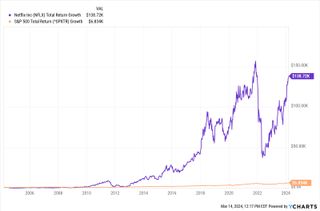If You'd Put $1,000 Into Netflix Stock 20 Years Ago, Here's What You'd Have Today
Netflix stock is down 13% from its record closing high, but it's still a long-time market beater.


Netflix (NFLX) stock is notoriously volatile. And while some nimble traders have surely used NFLX's gut-wrenching swings to their advantage over the years, plenty of punters with less fortunate timing have just as assuredly had their faces ripped off.
Netflix's truly long-time shareholders are in another class entirely. Those who bought stock in the streaming media giant two decades ago – and then held and held and held through NFLX's many vertiginous ups and downs – have enjoyed outstanding returns vs the broader market.
Alas, these same patient investors who have done so well over the years can still relate to damaged day traders. For even they have seen a good chunk of their wealth evaporate on paper since late 2021.

Sign up for Kiplinger’s Free E-Newsletters
Profit and prosper with the best of expert advice on investing, taxes, retirement, personal finance and more - straight to your e-mail.
Profit and prosper with the best of expert advice - straight to your e-mail.
That's because as successful as Netflix has been – and may continue to be – it remains at its core a fundamentally insecure business model. (Just look at NFLX stock's volatility for proof.)
On the plus side, Netflix is the king of on-demand streaming entertainment, serving TV series, films and games via 260 million paid memberships in more than 190 countries. It furthermore lays claim to arguably the best brand in the industry.
On the downside, Wall Street puts relentless pressure on the company to grow its subscriber base. As a consequence, Netflix must spend tens of billions of dollars on content to attract and retain viewers. Competition from the likes of Walt Disney (DIS), Apple (AAPL), Paramount (PARA), Amazon.com (AMZN) and others have forced Netflix to splurge on efforts to acquire, license and produce content over the past several years.
After peaking at $17.7 billion in 2021 – a whopping 50% increase vs the previous year – Netflix managed to cut spending on content. The company spent about $13 billion on content in 2023, and plans to cough up roughly $17 billion for programming in 2024.
Investors are very much counting on the company to keep a lid on that cash burn going forward. But it's going to be hard.
After all, nothing hurts NFLX stock like losing subscribers. Recall that in April 2022, shares plunged after Netflix reported its first loss of subscribers in more than a decade. The company shed in excess of $50 billion in market value overnight.
It's also worth recalling that Netflix stock was already in a steep decline at that point. Sluggish subscriber growth and rising costs had long knocked it off its perch. Indeed, shares hit an all-time closing high of $691.69 back in November 2021.
Note well that NFLX stock still trades about 13% below that level.
The bottom line on Netflix stock?

Which brings us to what you would have today if you had invested $1,000 in Netflix stock 20 years ago.
First things first, however: if you purchased $1,000 worth of NFLX stock in early November 2003 and sold it at its November 2021 peak, you would have grossed nearly $158,000.
However, as noted, things have turned south since then. Check out the above chart and you'll see that if you invested $1,000 in NFLX stock 20 years ago – and did not sell at the peak – today you would be sitting on not quite $139,000.
That's still a terrific return, of course. For comparison's sake, $1,000 invested in the S&P 500 over the same time frame would theoretically be worth a little more than $6,800 today. (The broader market's return includes dividends, which Netflix doesn't pay.)
The good news is NFLX stock has clobbered the broader market over the long term, generating an annualized total return of 33.1% over the past 20 years, vs 10.4% for the S&P 500.
The less good news is that Netflix stock remains below its all-time high – and it could take a while to get back to that level.
The Street's consensus recommendation on this communication services stock comes to Buy, but with fairly mixed conviction. Of the 48 analysts issuing opinions on NFLX surveyed by S&P Global Market Intelligence, 23 rate it at Strong Buy, six say Buy and 16 call it a Hold. Two analysts rate it at Sell, while one says it's a Strong Sell.
Patient investors have done exceedingly well sticking by Netflix stock thus far. Unfortunately, it looks like they're going to have to wait quite a bit longer to recover what their brokerage statements said they once had.
More Stocks of the Past 20 Years
- If You'd Put $1,000 Into Apple Stock 20 Years Ago, Here's What You'd Have Today
- If You'd Put $1,000 Into Amazon Stock 20 Years Ago, Here's What You'd Have Today
- If You'd Put $1,000 Into Nvidia Stock 20 Years Ago, Here's What You'd Have Today
- If You'd Put $1,000 Into Adobe Stock 20 Years Ago, Here's What You'd Have Today

Dan Burrows is Kiplinger's senior investing writer, having joined the august publication full time in 2016.
A long-time financial journalist, Dan is a veteran of SmartMoney, MarketWatch, CBS MoneyWatch, InvestorPlace and DailyFinance. He has written for The Wall Street Journal, Bloomberg, Consumer Reports, Senior Executive and Boston magazine, and his stories have appeared in the New York Daily News, the San Jose Mercury News and Investor's Business Daily, among other publications. As a senior writer at AOL's DailyFinance, Dan reported market news from the floor of the New York Stock Exchange and hosted a weekly video segment on equities.
Once upon a time – before his days as a financial reporter and assistant financial editor at legendary fashion trade paper Women's Wear Daily – Dan worked for Spy magazine, scribbled away at Time Inc. and contributed to Maxim magazine back when lad mags were a thing. He's also written for Esquire magazine's Dubious Achievements Awards.
In his current role at Kiplinger, Dan writes about equities, fixed income, currencies, commodities, funds, macroeconomics, demographics, real estate, cost of living indexes and more.
Dan holds a bachelor's degree from Oberlin College and a master's degree from Columbia University.
Disclosure: Dan does not trade stocks or other securities. Rather, he dollar-cost averages into cheap funds and index funds and holds them forever in tax-advantaged accounts.
-
 Is 100 the New 70?
Is 100 the New 70?Eating well, exercising, getting plenty of sleep and managing chronic stress can help make you a SuperAger. Funding that long life requires longevity literacy.
By Phil Wright, Certified Fund Specialist Published
-
 Nine Lessons to Be Learned From the Hilton Family Trust Contest
Nine Lessons to Be Learned From the Hilton Family Trust ContestDisclaimers, good communication, post-marital agreements and more could help avoid conflict in a family after the owners of a wealthy estate pass away.
By John M. Goralka Published
-
 Stock Market Today: S&P 500, Nasdaq Extend Losing Streaks
Stock Market Today: S&P 500, Nasdaq Extend Losing StreaksThe two indexes have closed lower for five straight sessions.
By Karee Venema Published
-
 Stock Market Today: Dow Slips After Travelers' Earnings Miss
Stock Market Today: Dow Slips After Travelers' Earnings MissThe property and casualty insurer posted a bottom-line miss as catastrophe losses spiked.
By Karee Venema Published
-
 Stock Market Today: Stocks Stabilize After Powell's Rate-Cut Warning
Stock Market Today: Stocks Stabilize After Powell's Rate-Cut WarningThe main indexes temporarily tumbled after Fed Chair Powell said interest rates could stay higher for longer.
By Karee Venema Published
-
 Stock Market Today: Stocks Reverse Lower as Treasury Yields Spike
Stock Market Today: Stocks Reverse Lower as Treasury Yields SpikeA good-news-is-bad-news retail sales report lowered rate-cut expectations and caused government bond yields to surge.
By Karee Venema Last updated
-
 Stock Market Today: Nasdaq Leads as Magnificent 7 Stocks Rise
Stock Market Today: Nasdaq Leads as Magnificent 7 Stocks RiseStrength in several mega-cap tech and communication services stocks kept the main indexes higher Thursday.
By Karee Venema Published
-
 Stock Market Today: Stocks Tumble After a Hot Inflation Print
Stock Market Today: Stocks Tumble After a Hot Inflation PrintEquities retreated after inflation data called the Fed's rate-cut plans into question.
By Dan Burrows Published
-
 Stock Market Today: Stocks End Mixed Ahead of Key Inflation Reading
Stock Market Today: Stocks End Mixed Ahead of Key Inflation ReadingEquities struggled before tomorrow's big Consumer Price Index report.
By Dan Burrows Published
-
 Stock Market Today: Stocks Closed Mixed in Choppy Trading
Stock Market Today: Stocks Closed Mixed in Choppy TradingVolatility returned as market participants adjusted their expectations for rate cuts.
By Dan Burrows Published